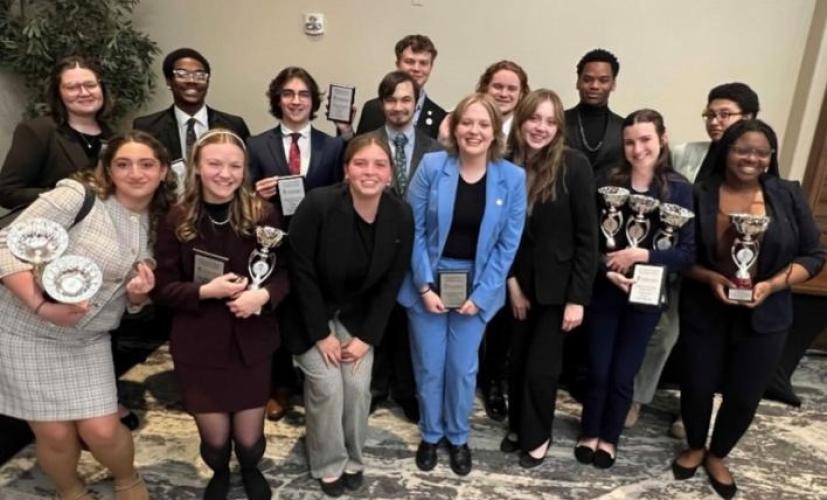
OHIO Speech and Debate Team: Preparation is critical to debate success

The two candidates for President of the United States are preparing to debate next week (Sept. 10), and those involved in Ohio University’s Speech and Debate Team have some simple advice – be prepared.
“Preparation and practice are key when going into a debate, but another aspect of that preparation is listening to criticism and then making adjustments,” said Michael Gallagher, a junior sociology pre-law major with a minor in journalism news and information from Barnesville, Ohio, who has been on the team for three years. “The criticism part is such an important aspect of debate prep. You have to take those criticisms of your performance into consideration and develop your skills based on that. What do people not like about you or what you are saying? You are trying to appeal to an audience. For the presidential candidates, the big thing they need to be thinking about is what the audience wants to hear.”
Ohio University’s Speech and Debate Team consistently wins regional and national awards. It was a founding member of the National Forensic Association (NFA) in 1971 and competes each year from September through April. Students on the team focus on preparation. The students become critical thinkers who can pull things apart and put things back together. They run practice debates because their coach, Jennifer Talbert, says the more you do it, the better you are. Talbert is part of the School of Communication Studies in the Scripps College of Communication. Her full title is the John A. Cassese Director of Forensics.
“You cannot be successful on a wing and a prayer. You have to practice it over and over again,” said Talbert. “You also have to be able to take criticism. If you can’t take critique, it’s very difficult to get better. I think a key ingredient to being better at speech and debate is the ability to take criticism. You don’t have to agree with every critique, but you can’t think those critiques are wrong every single time.”
Gallagher says he got involved with Speech and Debate at Ohio University after a friend recommended it to him.
“I was surprised to find Speech and Debate very fun and very stimulating to my brain,” said Gallagher. “I get to take my ideas out into the world and see what people think.”
But while fun, just like any other competitive venture, in order to be successful you have to take it seriously and practice. The team runs through mock debates practicing possible scenarios and questions.
“A good way to get used to debating is to just get used to talking. You have to be comfortable going into an unfamiliar environment and you have to project confidence in what you are saying. No one is going to believe you if you don’t believe in yourself,” said Gallagher. “You also have to think of it as a competition. One person is walking away as the winner.”
The debates Gallagher participates in are different than a presidential-style debate. They are timed events, where he is assigned a topic at random and assigned if he will debate the affirmative or negative side of the issue. Then, he gets 30 minutes to prepare for the debate.
“Practices help you get used to the format and thinking on your feet and responding,” said Gallagher. “In the weeks or months leading up to the debate, I study current events and policy issues because those are normally the kind of topics they use and going in with that knowledge makes the whole thing less intimidating because you start well informed.”
Because the result of the last presidential debate in June was a candidate withdrawing from the race, Gallagher and Talbert say the stakes are high for both Vice President Kamala Harris and former President Donald Trump.
“If I were in either of their shoes, I would be inhaling data. My full-time job would become just reading and knowing what is going to appeal to what demographics. You just need to know information,” said Gallagher. “Since they don’t get their questions or topics ahead of time, they have to be ready for anything. It’s an element of trying to expect the unexpected. Up until the last second of getting on stage, they should still be reading what is going on in the world.”
“I think more people will watch (the debate), especially younger people and people of color,” said Talbert. “If she performs well, it’s an opportunity to get momentum behind her from younger people. I think this next debate is key for both candidates especially since the last one ended so poorly.”
To learn more about how to get involved with the Speech and Debate Team – contact Talbert at jtalbert@ohio.edu or see the website for student organizations in the Scripps College of Communication.
